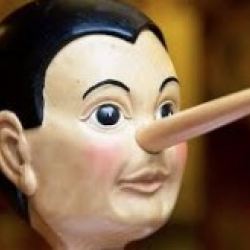At The Council, one of the most pressing topics that we write about is the quality and integrity of scientific publications.
See, for example, Alex Berezow's The Death Of Science Journalism and PLoS Biology Senior Editor Liza Gross: An Activist With No Biology Education, and Hank Campbell's Retraction Watch Begins For Gary Ruskin Conspiracy Claims In Critical Public Health. There seems to be precious little of quality or integrity these days.
While this is hardly new, it seems to be more prevalent. There can be no better example of how low scientists can go than Andrew Wakefield's fraudulent, scummy 1998 Lancet paper, which was the fuel behind the resurgent anti-vaccine movement that we still see today.
Although how this trickery made it into Lancet in the first place is still discussed today, so is the retraction of the paper, which did not occur until 12 years later. And even the retraction itself was "dishonest."
"This retraction was published as a small, anonymous paragraph in the journal, on behalf of the editors. Wakefield et al. were held guilty of ethical violations (they had conducted invasive investigations on the children without obtaining the necessary ethical clearances) and scientific misrepresentation..." --T. S. Sathyanarayana Rao and Chittaranjan Andrade, The MMR vaccine and autism: Sensation, refutation, retraction, and fraud Indian Journal of Psychiatry (April 2011)The crappy science band plays on. This time it's Science that played the fool. Researchers Peter Eklöv and Oona Lönnstedt published a 2016 paper that tiny particles of plastic in the ocean were harming fish. After all, we all know that plastic is an environmental problem (and sometimes it sure is) and that nanoparticles are now the villains du jour, so it is a foregone conclusion that microscopic plastic must be harmful to fish, especially hampering their efforts to avoid predators. Lönnstedt and Eklöv sure think so.
Except it's all a big lie. As reported in the latest edition of Nature, authors Eklöv and Lönnstedt, whose 2016 paper in Science raised some questions among fellow scientists, have been found guilty of "misconduct in research," and have retracted the paper (1).
"[A]n expert group of Sweden’s Central Ethical Review Board, which was also tasked with vetting the study, concluded in April 2017 that Lönnstedt and Eklöv “have been guilty of scientific misconduct”. The researchers defended the paper but requested that Science retract it in light of questions about their findings." -Quirin Schiermeier, Nature, December 7, 2017Although it is generally considered poor form to say, "We told you so," we are going to do it anyhow.
We told you so.
In December 2016, my colleague Julianna LeMieux wrote "Paper Scandal At Science? Microbeads Lying In The Weeds, And A Stolen Computer," in which she thoroughly eviscerated the Lönnstedt study for:
- Missing data
- Inconsistencies in the sample sizes reported and the microplastic exposure concentrations used
- Issues with the statistical design and analyses
- Large disparities in the way the experiment has been reported by the authors compared with the reports of eyewitnesses
"This time, if the dog ate your homework (and you did not make a copy,) you fail. Scientific raw data has to be in existence and available to others. No data. No paper." --Dr. Julianna LeMieux, May 5, 2017Enough already. Politicians make their living by lying. Scientists are supposed to do the opposite. Yet we seem to have reached a place where ideology and personal gain trump the truth. This is not science, just sleaze.
NOTE
(1) Lönnstedt, O. and Eklöv, P. Science 352, 1213–1216 (2016); retraction 356, 812 (2017).

No comments:
Post a Comment